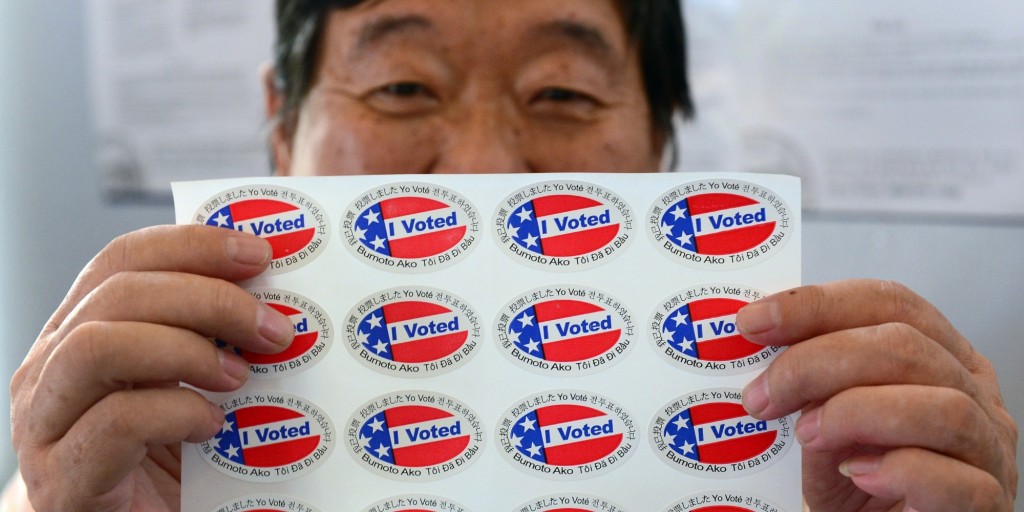By Guest Contributor: Jason Fong (@jasonfongwrites)
This post was originally published at Jason Fong Writes.
First – I hope you’re registered to vote. If you aren’t registered, you can do so here.
I think it’s really important for us to participate in our nation’s democracy and be part of the political discourse, and voting is certainly an integral part of that. But that’s not the main reason why I think it’s important for members of the AAPI community to register to vote and actually vote.
REGISTER TO VOTE because this isn’t just about you. This is about those who don’t have that right but still deserve to be heard. Your vote includes the voices of our families, friends, and fellow community members who – for one reason or another – are not eligible to vote.
Just because people aren’t voters, it doesn’t mean that they aren’t affected by how people vote. I can’t vote and yet I am affected by policies regarding immigration, education, and social justice. I go to public school and see the influence of voters everyday in the curriculum, the allocation of resources, and the quality of teaching. I am affected by immigration policies, as many of my family members live overseas or are recent arrivals. I am affected by actions of politicians who may or may not believe in climate change and in investing in efforts to promote environmental sustainability.
However, I’m one of the lucky ones because I won’t be ineligible for much longer, as I can register to vote when I turn 18. But what about the millions in our community who aren’t as lucky?
Who will speak for the undocumented? The undocumented immigrant population (which includes about 1.5 million Asian Americans) contributed an estimated $11.8 Billion in state and local taxes in 2012 alone; and in California, they paid about $3.2 Billion in taxes in 2012. Undocumented Americans contribute much to our economies but they cannot vote.
Who will speak for those who are incarcerated and find themselves deported from their homes in the U.S.? In the past few decades, deportations of AAPI who are incarcerated have increased and deportation policies have had a disproportionate impact on the Southeast Asian American community who arrived in the U.S. as refugees. These thousands of people lack voting rights and yet their lives and the lives of their families are profoundly affected by governmental policies. They have no say about who gets elected and what propositions are passed.
Who will speak for our youth? In 2012, about 21% of the Asian American community was under 18. Those children are subject to policies at school, home, and in their communities. They need informed voters like you to help shape health, safety, and educational policies.
Your vote matters to me and to the millions in our community who are ineligible to vote, because today, not only do we lack voting rights, but we are also in danger of even further marginalization in terms of representation. We are in danger of not even being counted.
On December 8, 2015, the Supreme Court of the United States heard oral arguments in the case of Evenwel v. Abbott where the issue is whether state electoral districts should continue to be drawn based on total population rather than on the number of eligible or registered voters. The plaintiffs in this case want electoral districts for the Texas state legislature to be drawn based on the number of eligible voters rather than total population because they argue that the current system of counting everyone results in those who live in districts with many eligible voters having their votes diluted in comparison to those who live in districts with fewer eligible voters.
Some are concerned that redrawing districts by counting only eligible voters will have “strong implications…particularly in states with significant minority populations who are ineligible to vote.” According to a spokesman for the Democratic National Committee, since about “one in four Asians and Pacific Islanders are not yet citizens,” their exclusion would “significantly decrease their political power relative to other groups, such as the white plurality.”
According to Asian Americans Advancing Justice, if the plaintiffs in Evenwel prevail, the 500,000-700,000 Asian Americans and Pacific Islanders who live in Texas who are not registered or eligible to vote will not be counted and represented. How can state leaders run a state without taking into the account the voices of over half a million people? When did being an elected official become limited to merely representing the voices of a few as opposed to their entire community and constituency?
While Evenwel is limited to Texas, what happens if the other states also decide to redraw their lines in this new manner? What if congressional districts are also redrawn based on eligible voters rather than on total population? What impact will this have on young, immigrant communities like ours that have lower levels of eligible voters?
We will likely have even less of a say in our government’s policies and even weaker representation. This means that registering to vote and voting mean more now than ever before.
So if you’re a U.S. citizen and 18 or older, please register to vote today. And tell a friend. I know that there are many AAPI college students out there who are very busy and haven’t gotten around to register. Please register today. It only takes a few minutes. If you are part of an AAPI campus student organization, spread the word to your members. Our community has one of the lowest rates of voter turnout in the U.S., as only 56% of Asian American and 58% of Pacific Islander adult citizens are registered to vote, and only about 47-48% of AAPI adult citizens registered to vote report having actually voted in the 2012 presidential election. Campus leaders like you can help turn these numbers around.
Now more than ever, every vote counts.
Thanks.

Jason Fong is a 16 year-old writer. He is in the eleventh grade at Redondo Union High School in Redondo Beach, California. He is the creator of the popular hashtag #MyAsianAmericanStory.
Learn more about Reappropriate’s guest contributor program and submit your own writing here.


